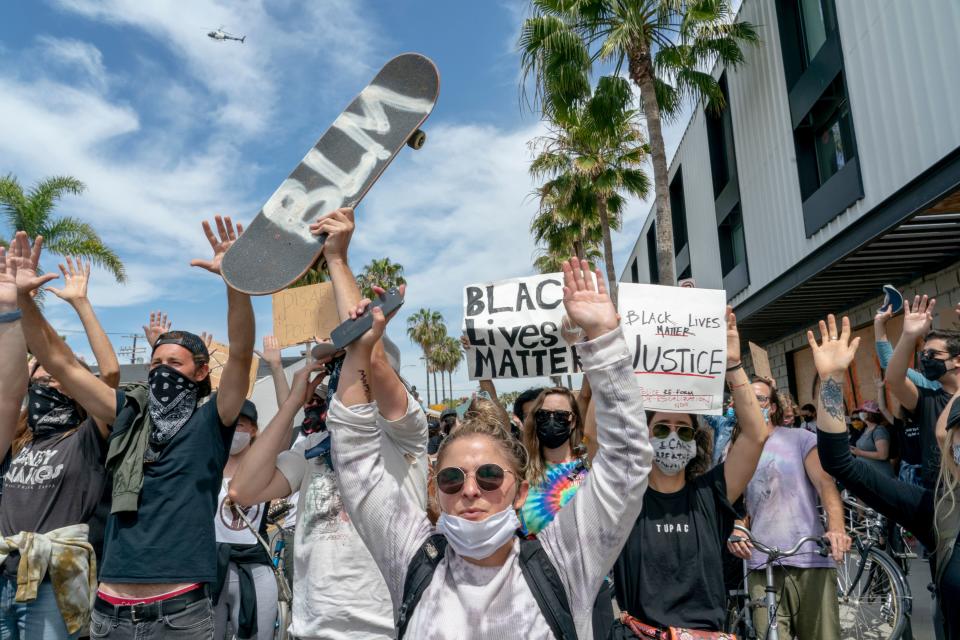'I’m excited to see the world is watching': How one racial injustice march reverberated in Los Angeles
VENICE, Calif. — Seven hundred people, maybe more, flowed past Krislin, a black woman who stood on a curb with her right hand over her heart. They carried signs and hollered for justice, straight down the middle of a four-lane road, straight through the middle of town.
Krislin said she was thinking about her brothers and parents and aunts and uncles and cousins, and about the men and women and boys and girls she didn’t know personally but whose stories she has a sense of, and how they all fit into a time and a place like this one.
On a humid Tuesday morning, she watched the people go by. She was still. She barely even blinked. When someone asked why her hand was on her heart, she looked to see, maybe expecting her hand to be at her side, maybe surprised to find it where it was.
“My heart,” she said, “is so heavy. I think I’m just holding it up.”
Two black-and-white helicopters hovered overhead. Two police cars — SUVs — blip-blipped from across the block, then made polite U-turns as marching protesters paused and waved them through.
Krislin, who requested her last name be withheld, had been working in one of the shops behind her. She wore a paper mask and thin rubber gloves. Two co-workers stood nearby. They’d come out to the curb for the scene of all these people — mostly young, mostly white, angry enough to trudge five miles while shouting the names: George Floyd, Ahmaud Arbery, Breonna Taylor.

Already the march had passed buildings boarded against trouble, homeless camps, merchants and construction workers with their fists raised, past the hippies and artists and surfers, past the ladies with their small dogs and trays of coffee cups and the grown men on beach cruisers who knew this town before it went quite so corporate, who knew this town when it stood for something.
The protest was peaceful. One white woman stood at her gate with her middle finger raised, snarling at folks to get off her block, and she went almost unseen. A white man in a blue van aimed at protesters with a finger gun, and he was waved away. Violence was contained to a skateboard-scooter collision. The former limped away tapping his chest, the latter shouting his apologies. A speech from Martin Luther King Jr. thundered from a boombox in a young woman’s bike basket. From another basket, Bob Marley sang backup.
The guy who owns a bar on Abbot Kinney Boulevard, where the march took its first steps, watched the people pass from his roof, across his rainbow-colored crosswalk. Then he joined the march.
“Hands up, don’t shoot,” they cried.
While LAPD squad cars cleared the next intersection.
“No justice, no peace. No racist po-lice,” they shouted.
While a flock of officers trailed on mountain bikes.
“Say his name,” they demanded.
“George Floyd,” they seethed.
While National Guardsmen and armored police remained out of sight.
Cars veered to curbs, young men and women emerged and feathered into a demonstration that perhaps doubled in size over those five miles. Horns blared in support.
Venice, CA pic.twitter.com/UZyLzUxLkm
— Tim Brown (@TBrownYahoo) June 2, 2020
Two days before, shops in Santa Monica, the next town over, had been broken into, damaged and left bare. Curfews across Los Angeles were set and largely enforced. Late-night rumors of a protest on Abbot Kinney, among the toniest of Los Angeles’ Westside avenues, moved owners to board up their stores. On the plywood, they’d spray-painted messages of support for the people and causes that sought justice for the innocent, reprisal for the worst among us.
Even amid the many shoes that scuffed along narrow streets, and for the hoarseness of the voices by the end, it was fair to wonder who would hear them. Who could possibly hear them. Who would try.
In the same arena as honest protests that turn violent. Downwind from the incessant, harmful and backward clatter of Washington. Across a haze of spray and smoke and hatred, where one doesn’t have to see an enemy to know he is there. For nearly nine minutes the police had knelt on that man’s neck, and he was merely the one the world had seen, the man whose cries would be heard days before his own funeral.
So, maybe one person would hear. Maybe a thousand. Hear their footsteps. Hear their message. Hear the conversation that has to start again, again. At the end, they knelt on rutted concrete in an intersection and said the man’s name — George Floyd — and were silent for a time. Someone will see or they won’t. It is their choice. Someone will hear or they won’t. They’d have to try.
And someone will stand to the side, hurting, hoping, so broken she’d have to hold up her own heart.
“It’s sad to see people have to protest like this,” Krislin said. “But, it speaks volumes about how far we’ve come.”
She paused and admitted, “And how far we have to go. It’s tiring. Still, I’m excited to see the world is watching.”
More from Yahoo Sports:

 Yahoo Finance
Yahoo Finance 
